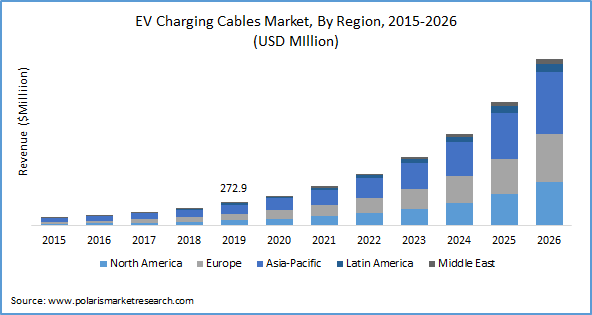New York City, 20 Jul 2020: The global EV Charging Cables market size is expected to reach USD 1,992.5 million by 2026 according to a new study by Polaris Market Research Governments all across the world are taking initiatives to promote the adoption of electric vehicles. Countries such as China, India, France, and the U.S. have invested significantly in the development of charging infrastructure to support market growth. Governments have also introduced stringent regulations regarding vehicular emissions to encourage the use of electric vehicles, which further drives the growth of the market. Market players are introducing technologically advanced EV charging cables in the market to appeal to a range of consumers. Innovations in the market have resulted in the launch of charging cables with reduced charge time and low overall costs. Technological advancement in terms of miniaturization and improvement of components has encouraged established organizations, and small and medium enterprises to invest in EV charging cables.
The different charging levels used in the global market include level 1, level 2, and level 3. Level 1 is a single-phase cable that provides battery recharge through an alternating-current plug and a dedicated circuit. It does not require the installation of charging equipment. It usually requires 8 to 12 hours to completely charge a battery, and is usually used for home purposes.
 |
| Request for sample pages |
On the basis of application, the market is segmented into public and private. The governments across the world are investing significantly in deployment of public charging infrastructure by subsidizing the construction of charging stations. France has declared its goal to deploy 7 million outlets by 2030 for the cars to recharge. In 2016, Korea upgraded its former target of deploying publicly accessible fast chargers from 1,400 to 3,000 by 2020 to increase the adoption of electric vehicles. Norway provides public funding for construction of fast-charging stations every 50 km on main roads. In the United Kingdom, $650 is offered for the installation of a dedicated home charger for an electric car.
The market is segmented into Alternate, and Direct Charging based on power supply. AC transforms the incoming AC and into DC, and then forwarded to the battery pack. AC stations are widespread and offer vehicle recharge at affordable rates. However, the demand for DC is increasing owing to faster charging duration. BMW has launched its BMW Digital Charging Service (DCS), which is an intelligent cost-effective service optimizing charging technology for BMW i and BMW iPerformance vehicles. After activation of DCS, the recharge process is carried out independently and autonomously. DCS is based on principles on Tariff and solar optimised vehicle recharge. On the basis of shape, the market is segmented into straight and coiled. In 2019, the straight EV charging cables dominated the global market.
Asia Pacific emerged as the largest market in 2019 and is expected to maintain its dominance over the forecast period. Growing concerns regarding air pollution and increasing need of fuel efficient vehicles have increased the number of electric cars in countries, such as China, U.S., India, and Japan, driving the growth of market. The National Electric Mobility Mission Plan (NEMMP) 2020 in India projects sales of 6–7 million units of electric vehicles, and a subsequent fossil fuel saving of 2.2 – 2.5 million tons. This would result in considerable reduction in vehicular emissions, and decrease in carbon dioxide emissions by up to 1.5% by 2020. The increasing penetration of electric vehicles is expected to fuel development of enhanced charging infrastructure, further increasing the demand for EV charging cables.
Vendors in the global market are expanding their geographical presence and product portfolios to strengthen their presence. The developing nations of Asia-Pacific would provide significant growth opportunities in the market. Some of the major market participants include Phoenix Contact, Dyden Corporation, TE Connectivity, Coroplast, Leoni AG, BESEN International Group, Sinbon Electronics, Systems Wire and Cable, General Cable Technologies Corporation, Chengdu Khons Technology Co., Ltd., Manlon Polymers, Eland Cables, EV Teison, Aptiv Plc., and Brugg Group.